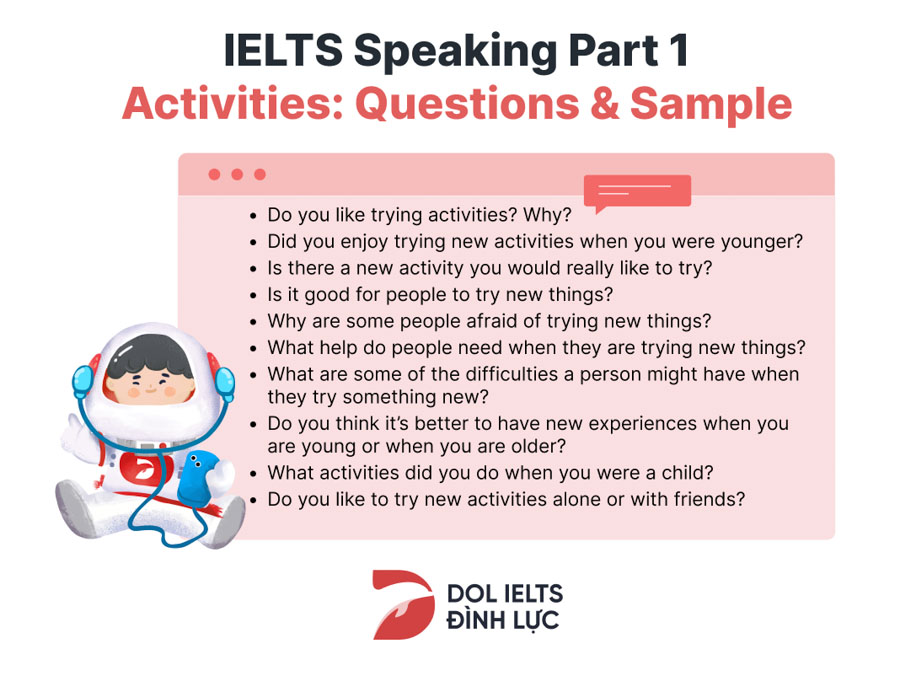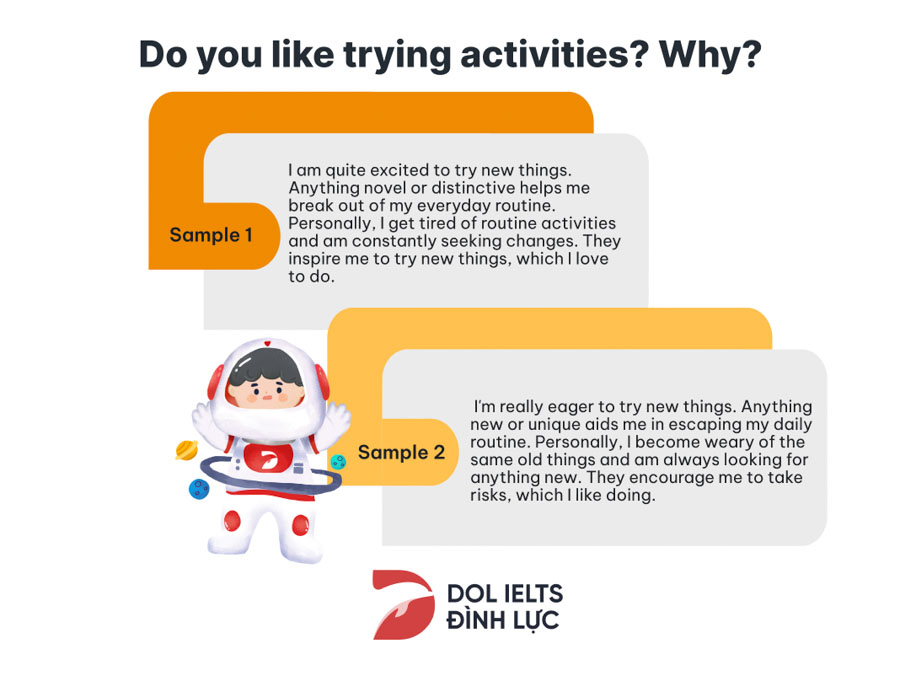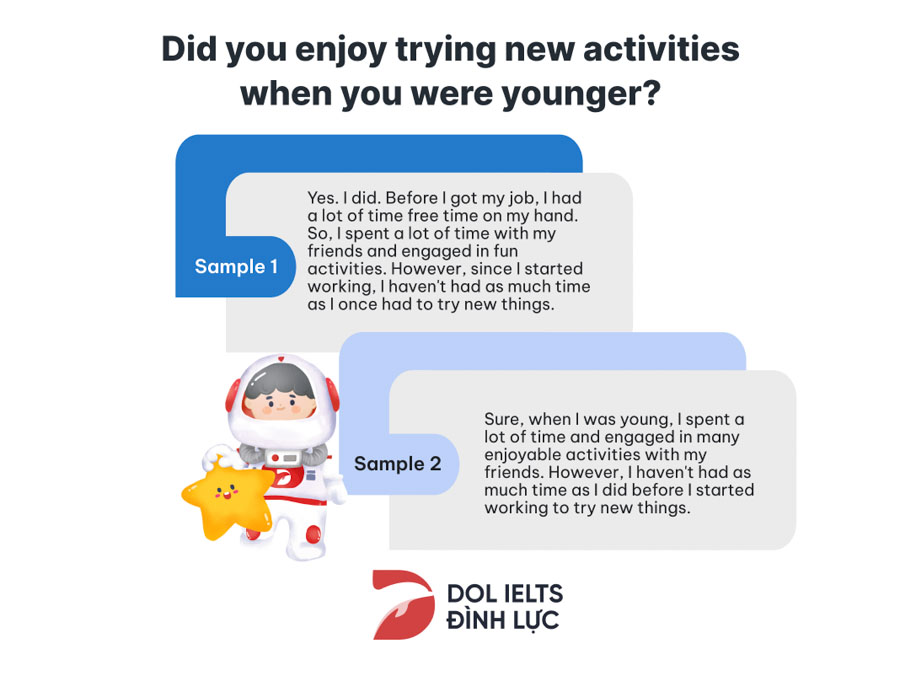IELTS speaking part 1 topic activities: Câu hỏi, câu trả lời & từ vựng
IELTS Speaking part 1 Activities đã là một chủ đề quá quen thuộc, với tần xuất ra thi rất cao trong phần thi IELTS speaking part 1. Tuy nhiên, nhiều bạn thí sinh vẫn thiếu vốn từ vựng và cách thức để triển khai một câu trả lời, dẫn tới việc lúng túng trong phòng thi. Trong bài viết này, DOL sẽ cùng các bạn “xử gọn” 10 câu hỏi thường hay gặp nhất trong phòng thi cho topic này, để biến việc trả lời câu hỏi cho topic Activities trở nên nhẹ nhàng hơn bao giờ hết.
DOL IELTS Đình Lực
Jan 02, 2023
2 mins read

Table of content
1. Do you like trying activities? Why?
2. Did you enjoy trying new activities when you were younger?
3. Is there a new activity you would really like to try?
4. Is it good for people to try new things?
5. Why are some people afraid of trying new things?
6. What help do people need when they are trying new things?
7. What are some of the difficulties a person might have when they try something new?
8. Do you think it’s better to have new experiences when you are young or when you are older?
9. What activities did you do when you were a child?
10. Do you like to try new activities alone or with friends?
Câu hỏi thường gặp

1. Do you like trying activities? Why?

Sample 1: I am quite excited to try new things. Anything novel or distinctive helps me break out of my everyday routine. Personally, I get tired of routine activities and am constantly seeking changes. They inspire me to try new things, which I love to do.
Sample 2: I'm really eager to try new things. Anything new or unique aids me in escaping my daily routine. Personally, I become weary of the same old things and am always looking for anything new. They encourage me to take risks, which I like doing.
2. Did you enjoy trying new activities when you were younger?

Sample 1: Yes. I did. Before I got my job, I had a lot of time free time on my hand. So, I spent a lot of time with my friends and engaged in fun activities. However, since I started working, I haven't had as much time as I once had to try new things.
Sample 2: Sure, when I was young, I spent a lot of time and engaged in many enjoyable activities with my friends. However, I haven't had as much time as I did before I started working to try new things.
3. Is there a new activity you would really like to try?
Sample 1: Yes, a lot, actually. I've been thinking about taking up skiing lately. I'll ask a friend of mine who is a fantastic skier to teach me the fundamentals when I have some free time.
Sample 2: Sure, I’ve been thinking a lot about go hiking. I love nature, and hiking really helps me to be more connected with nature. Recently, I’ve got a lot going on in my life so I haven’t really got the time to go on a hike. But I can see that in the future, maybe I’ll give it a try.
4. Is it good for people to try new things?
Sample 1: Definitely yes, because doing anything new broadens perspectives and enlivens the soul. Naturally, it can be intimidating at first, but it's worthwhile to try since it gives individuals the chance to expand their brains and gives them a feeling of being up in the air. By trying something, people can get to know themselves better and perhaps even find hidden skills. It fosters personal development and promotes good health while helping people get out of the ruts. Additionally, it fosters creativity and confidence in both men and women by assisting them in overcoming their worries and providing them with a new viewpoint. So yes, it is undoubtedly beneficial for everyone.
Sample 2: Yes, without a doubt, as learning something new broadens horizons and energizes the soul. People can learn more about themselves by attempting new things, and they could even discover hidden talents. It assists people in breaking out of ruts and supports personal growth while promoting health.
5. Why are some people afraid of trying new things?
Sample 1: Well, I believe that their primary motivation for sticking to their routines is a fear of stepping outside of their comfort zones. They could also be anxious about making mistakes or uneasy with the unknown. Some people may just fear change and the possibility of losing what they presently possess. Others could be hesitant to attempt something new because they are unsure of the experience and concerned about the result.
Sample 2: Well, I think their main reason for adhering to their routines is because they are afraid to leave their comfort zones. They could also feel nervous or fearful of the unknown or worry about making blunders. Some people can just be afraid of change and the prospect of losing what they already have. Others could be apprehensive to try anything new since they don't know what to expect and are worried about the outcome.
6. What help do people need when they are trying new things?
Sample 1: Oh, I think I should start with psychological support. I refer to support in coping with a range of emotions such as anger, relief, and worry as well as straightforward advice and methods for handling the stress brought on by change. Plus, trying new things require confidence in their abilities to persevere as well as encouragement for even little successes. Some people might want assistance in understanding the advantages of attempting something new since these advantages may end up being the main motivator for them to face their anxieties. I also hazard a guess that certain people would want professional direction in order to feel safe and secure and worry-free in terms of material or physical injuries.
Sample 2: Oh, I guess I should start with counseling. I'm referring to clear guidance and strategies for managing the tension that comes with change, as well as assistance in coping with a variety of emotions including anger, relief, and concern. On top of that, individuals need support for even small victories as well as faith in their capacity to endure. Some people might need help comprehending the benefits of trying something new because they may serve as their primary impetus for overcoming their fears. In order for certain folks to feel confident and worry-free about the material or bodily harm, I hazard a guess that they might demand expert guidance.
7. What are some of the difficulties a person might have when they try something new?
Sample 1: Oh, one of the difficulties people may have is making mistakes that might endanger them or others. Another is that they can get bored with what they're doing and lose interest in it, which might make them feel bad and ruin their mood. Another issue I can come up with is a lack of confidence because it did not turn out as well as they had anticipated, which will deter them from attempting new things and doing new things for a while. I suppose these are the most major challenges one might encounter while undertaking a new endeavor.
Sample 2: Oh, I see, one of the challenges people may face is making mistakes that might put them or others in danger. Another is that they could become disinterested and bored with what they're doing, which might make them feel awful and put them in a poor mood. Another problem I can think of is a loss of confidence as a result of the outcome not being as good as they had hoped for, which will prevent them from trying new things and doing new activities for a while. These are probably the biggest difficulties one may run against while starting something new.
8. Do you think it’s better to have new experiences when you are young or when you are older?
Sample 1:You should absolutely learn new things when you are young since older individuals frequently believe they have had all the experiences they need and do not even attempt them. Also, as individuals age, they get weary of learning and, as a result, frequently decide to stop studying, even though they may not be aware of it. Another thing is that older adults require more time to learn new things because of physical changes like diminished eyesight and hearing that affect their capacity to pick up and master new abilities. Young age is thus without a doubt the optimum period for learning new experiences and abilities.
Sample 2: Since older people usually feel they have had all the experiences they need and do not even attempt them, it is vitally essential that you learn new things when you are young. As a matter of fact, people often opt to stop studying as they become older because they grow bored of learning, even if they may not be conscious of it. On top of that, physical problems like hearing loss and declining vision that hinder an older person’s capacity to acquire and master new skills necessitate longer learning times. So, it is obvious that youth is the best age to gain new skills and experiences.
9. What activities did you do when you were a child?
Sample 1: During my childhood, I took part in a lot of indoor and outdoor activities. But I used to play the guitar all the time when I had any free time. I was obsessed with it because the guitar has such a distinctive sound to it.
Sample 2: When I was small, I used to be a big fan of football. My friends and I went to the beach near my house every day to play football together. We really enjoyed each game.
10. Do you like to try new activities alone or with friends?
Sample 1: I have to say it depends on what activities we are talking about. If we’re talking about outdoor activities, then I’d definitely say that doing things outdoors with some friends is more fun and interesting. On the other hand, if we’re talking about indoor, more introverted kinds of activities like reading books or watching TV, for example. I would prefer to do these things on my own.
Sample 2: Obviously, it depends on the activities we're discussing. When it comes to outdoor activities, I would unquestionably assert that having a group of people along makes the experience more enjoyable and intriguing. On the other side, if we're discussing indoor, more introverted pursuits, like reading books or watching TV, for instance. I like to complete these tasks on my own.
Lúu ý giám khảo có thể sẽ ngắt lời bạn nếu câu trả lời của bạn quá dài hoặc lạc đề (chỉ trong phần một hoặc phần ba), giám khảo không thể ngắt lời bạn trong phần hai. Giám khảo cũng sẽ ngắt lời bạn trong phần ba nếu bạn đưa ra các ví dụ cá nhân, thay vì nói chung chung.
https://www.oxfordonlineenglish.com/top-10-tips-ielts-speaking-exam
Câu hỏi thường gặp
Làm thế để chuẩn bị tốt cho phần thi IELTS Speaking part 1?
Trả lời vừa đủ, không quá ngắn hoặc quá dài dòng
Hoạch định ra 1 số tình huống hoặc nội dung câu hỏi mà bạn có thể gặp phải trong phòng thi và đưa ra phương án xử lý trước
Cố gắng nghiên cứu và chuẩn bị tốt về nhiều chủ đề trong cuộc sống
Rèn luyện khả năng phát âm tiếng Anh
Ghi nhớ ngữ pháp và tăng cường vốn từ vựng tiếng Anh của mình
Không nên sử dụng những từ ngữ mà bạn không hiểu rõ chúng
Gợi ý trả lời câu hỏi: Do you like to try new activities?
Có thể trả lời như sau: Yes, I like to try new activities because it helps me to gain more knowledge and learn new skills. It enables me to broaden my intellectual abilities and competence. Also, I love the adventure connected with trying new activities. (Có, tôi thích thử các hoạt động mới vì nó giúp tôi có thêm kiến thức và học các kỹ năng mới. Nó cho phép tôi mở rộng khả năng trí tuệ và năng lực của mình. Ngoài ra, tôi thích cuộc phiêu lưu kết nối với việc thử các hoạt động mới.)
Giao tiếp bằng mắt có quan trọng trong IELTS Speaking không?
Mặc dù việc giao tiếp bằng mắt không ảnh hưởng trực tiếp đến điểm số IELTS Speaking của bạn. Nhưng nếu bạn thể hiện sự tự tin trong ánh mắt và thoải mái nhìn vào giám khảo sẽ giúp bạn gây được ấn tượng tốt.
Các quy tắc cơ bản khi nói tiếng Anh là gì?
Chú ý đến từ đồng âm
Cẩn trọng khi sử dụng tính từ và trạng từ
Sử dụng cách chia động từ sao cho chính xác
Dùng các liên từ để nối câu
Sử dụng đa dạng ngữ pháp
Ghi nhớ thứ tự của các câu hỏi
Trên đây là các gợi ý trả lời câu hỏi liên quan đến phần thi IELTS Speaking part 1: Activities, DOL English hi vọng qua bài viết này, các bạn có thể đạt được mục tiêu và band điểm speaking của mình trong thời gian sắp tới..
Tuy nhiên, nếu bạn đang băn khoăn không biết bắt đầu học IELTS từ đâu, kỹ năng tiếng Anh của mình đang ở đâu trong thang điểm IELTS, đừng nên bỏ qua chương trình ôn luyện IELTS tại DOL English. Chương trình luyện thi IELTS ở đây sẽ giúp bạn đánh giá khả năng tiếng Anh tương ứng với thang điểm IELTS và những điểm cần cải thiện, từ đó có kế hoạch ôn tập phù hợp.
Ngoài ra, DOL English còn sở hữu chương trình LinearThinking độc quyền giúp các học viên có được tư duy chính xác và hiệu quả nhất khi tiếp cận các tài liệu luyện IELTS. Để được tư vấn kỹ hơn về chương trình học và ưu đãi áp dụng, vui lòng để lại thông tin tại phần “Chat với IELTS Đình Lực”. Đội ngũ DOL English sẽ liên hệ hỗ trợ trong thời gian sớm nhất.
Table of content
1. Do you like trying activities? Why?
2. Did you enjoy trying new activities when you were younger?
3. Is there a new activity you would really like to try?
4. Is it good for people to try new things?
5. Why are some people afraid of trying new things?
6. What help do people need when they are trying new things?
7. What are some of the difficulties a person might have when they try something new?
8. Do you think it’s better to have new experiences when you are young or when you are older?
9. What activities did you do when you were a child?
10. Do you like to try new activities alone or with friends?
Câu hỏi thường gặp

